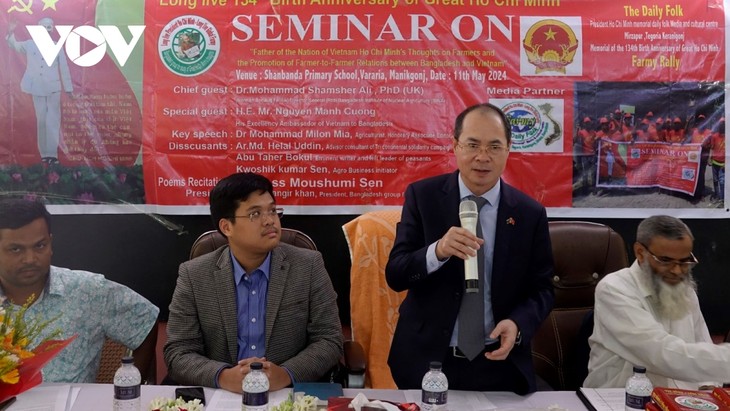A seminar themed "Ho Chi Minh's thoughts on the peasantry and promoting exchanges between Bangladeshi and Vietnamese farmers" was held in Manikganj province, Dhaka area, on May 11 by the Vietnamese Embassy in Bangladesh and a group of Bangladeshi scholars studying President Ho Chi Minh.

Ambassador Nguyen Manh Cuong speaking at the event (Photo: baoquocte.vn)
The event aims to mark the 134th birthday of President Ho Chi Minh (1890-2024) and the 70th anniversary of the Dien Bien Phu victory (1954-2024).
Speaking at the seminar, Ambassador Nguyen Manh Cuong reviewed some key features of the life, background and revolutionary career of President Ho Chi Minh and his great contributions in the struggle for the national liberation and unification, bringing independence, freedom and happiness to the Vietnamese people.
The merits of President Ho Chi Minh were truly revealed through the glorious resistance wars of Vietnamese army and people, especially the Dien Bien Phu Campaign in 1954.
At the event, the ambassador shared about the great values of Ho Chi Minh's thought in the work of building, protecting and developing Vietnam throughout history. During his lifetime, President Ho Chi Minh always had special affection for and affirmed the extremely important position and role of the peasantry in the Vietnamese revolution.
The ambassador said Ho Chi Minh's thought on the peasantry and agriculture remains intact, is a priceless heritage of the Vietnamese people, inherited and developed and applied creatively by the Party and State of Vietnam in all guidelines and policies. Thanks to that, in recent times, production productivity and quality of life of farmers have been increasingly improved and enhanced.
Based on the strong traditional friendship between the two nations, Ambassador Cuong hoped that activities of people-to-people exchange, connecting farmers’ associations of the two countries’ localities, and sharing experiences in agricultural production will continue to be enhanced, bringing practical benefits to both countries.
Within the framework of the seminar, many researchers expressed their respect for President Ho Chi Minh and special affection for the country and people of Vietnam.
Sharing about the moment when Bangladeshi people took to the streets to march in support of Vietnam and President Ho Chi Minh right after Bangladesh regained independence in 1971, researchers affirmed that the two countries have many similarities in their history of struggle for national liberation and up to now have always been close friends, supporting each other in their common cause of national construction and development.
A number of scholars from local universities shared their feelings and thoughts about President Ho Chi Minh and expressed their admiration for Vietnam's great socio-economic, scientific and technical achievements in recent times, especially in agriculture.
Scholars and representatives of the Bangladeshi farmers' associations presented books and self-penned poems praising President Ho Chi Minh, revolutionary heroism and history of the struggle for national liberation of the Vietnamese people to Ambassador Cuong. Local guests attending the seminar expressed their hope to soon visit Vietnam to directly learn about and experience the culture and daily life of Vietnamese people.
The seminar was a great success, leaving a deep impression on all Bangladeshi friends attending the event. This is a great encouragement for the embassy to continue organizing programs and activities to communicate, introduce and honor President Ho Chi Minh, National Liberation Hero, World Cultural Celebrity, to the international community./.
BTA